Throughout the election, pundits, candidates, the media, and polling firms like Latino Decisions, have kept close watch on the swing state of Florida. One of the tea leaves we have all tried to read is how strongly the Latino vote would break for Obama. He would need this important constituency to pull off a victory in this tightly-contested state. Speculation reached a fever pitch in the last few days leading up to the election, as two polls (see here, and here) indicated that the President was losing ground with Latinos in Florida. Numerous critiques of these surveys show that they wildly underestimated the strength of Latino voters’ support for Obama in the Sunshine State (for my take see here). In the end, exit polls show that Obama took 60% of the Latino vote in Florida, up from 57% in 2008.
Data collected over the course of the election by Latino Decisions should have made this no surprise. Latino Decisions surveyed registered Florida Latino voters in June, September, and on the eve of the election in November. These data show strong and consistent support for Obama in the months leading up to the election in terms of approval ratings (see below). Moreover, the Latino electorate in Florida was highly motivated to turn out to vote. In June, 63% of respondents said they were very enthusiastic about turning out. That number jumped to 70% in September. This enthusiasm translated into votes to re-elect the President (see Figure reflecting vote share below).
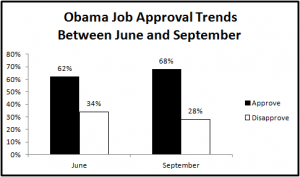
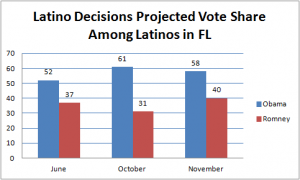
The data collected by Latino Decisions in Florida give us insight into how Obama won the Latino vote in Florida. The two most important issues facing these voters were the economy and immigration (see Figure below). Obama was on the correct side of both issues in the mind of Latino voters in Florida.
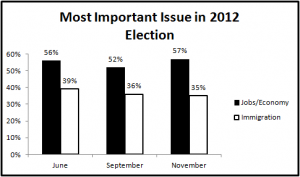
First, the economy: Florida’s unemployment rate is higher than the national average. Given that we typically vote with our wallets during tough economic times, why did Latinos still support the President at the polls? The figure below offers one answer. On the eve of the election, Latinos voters in Florida reported that they preferred Obama’s approach of mixing spending cuts with tax increases on the wealthy compared to Romney’s plan to only cut spending.
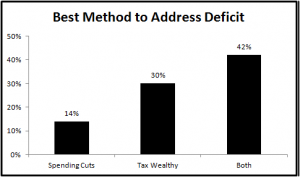
Second, immigration: As I’ve discussed before, deportation rates (though not the raw total of deportees at this point in time) have been higher during the Obama administration compared to George W. Bush’s. Nonetheless, Obama is still on the correct side of this issue in the minds of Latinos voters in Florida. The figure below shows that Latino voters in Florida have consistently been far more enthused about Obama’s recent moratorium on the deportation of undocumented immigrant youth to Romney’s “self-deportation” approach to immigration reform.
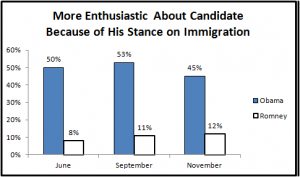
Being right on the economy and on immigration helped the president carry the Latino vote in Florida. But perhaps what sealed the deal is the community’s overall positive impression of President Obama and the Democratic Party compared to their views on the Republicans and Governor Romney. The figure below shows data from two slightly different sets of questions asked in June and November.
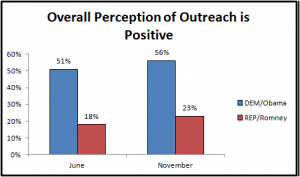
In June, Latino Decisions asked respondents:
Would you say the Democratic Party is currently doing a good job of reaching out to Hispanics, that they don’t care too much about Hispanics, or that they are being hostile towards Hispanics?
The same question was also asked in reference to the Republican Party. In total, 51% said the Democrats were “doing a good job” compared to 18% who said the same of the Republican Party (see left-hand-side of the figure above). In fact, 29% actually replied that the Republicans were hostile to Latinos (compared to 4% for the Democrats).
In November, respondents were asked:
Thinking about the 2012 campaign for President, would you say that Barack Obama is someone who truly cares about the Hispanic/Latino community, that he didn’t care too much about Hispanics/Latinos, or that Obama was hostile towards Hispanics/Latinos?
The same question was also asked in reference to Mitt Romney. Obama was perceived as far more caring (see right-hand-side of the figure above). In fact, 14% perceived the Governor as hostile (compared to 3% for the President).
Taken together, the GOP is on the wrong side of key issues with Latinos in Florida. Perhaps as a consequence, they are also perceived very negatively. There is some hope for conservatives in the future, however. In the November Latino Decisions poll, 39% of respondents said that if the Republican Party took an approach to immigration reform that includes a path to citizenship, they would be more likely to vote Republican. Now, in comparison, 42% said that this substantial policy change would have no influence on their vote. This said, in a swing constituency within a swing state, 39% could be enough to stem the tide of Democratic gains in Florida. Suffice to say, it is bad politics, and bad governance, for the GOP to ignore Latinos on immigration reform. Time will tell whether they have learned this lesson of 2012.
Casey A. Klofstad is an associate professor of political science at the University of Miami, Coral Gables, FL. He has a forthcoming article co-authored with Benjamin G. Bishin in Political Research Quarterly entitled, “The Political Incorporation of Cuban Americans: Why Won’t Little Havana Turn Blue?”. His book, Civic Talk: Peers Politics and the Future of Democracy, is now available in paperback. You can follow him on Twitter at @klofstad, and on Facebook at www.facebook.com/klofstad
The commentary of this article reflects the views of the author and do not necessarily reflect the views of Latino Decisions. Latino Decisions and Pacific Market Research, LLC make no representations about the accuracy of the content of the article.


